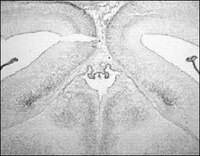PC364 Sigma-AldrichAnti-Netrin-1 (Ab-2) (497-508) Rabbit pAb
Recommended Products
Overview
| Replacement Information |
|---|
Key Specifications Table
| Host |
|---|
| Rb |
| Physicochemical Information |
|---|
| Dimensions |
|---|
| Materials Information |
|---|
| Toxicological Information |
|---|
| Safety Information according to GHS |
|---|
| Safety Information |
|---|
| Product Usage Statements |
|---|
| Packaging Information |
|---|
| Transport Information |
|---|
| Supplemental Information |
|---|
| Specifications |
|---|
| Global Trade Item Number | |
|---|---|
| Catalog Number | GTIN |
| PC364 | 0 |
Documentation
Anti-Netrin-1 (Ab-2) (497-508) Rabbit pAb Certificates of Analysis
| Title | Lot Number |
|---|---|
| PC364 |
References
| Reference overview |
|---|
| Varela-Echavarria, A. and Guthrie, S. 1997. Genes and Dev. 11, 545. Harris, R., et al. 1996. Neuron 17, 217. Keino-Masu, K., et al. 1996. Cell 87, 175. Mitchell, K.J., et al. 1996. Neuron 17, 203. Serafini, T., et al. 1996. Cell 87, 1001. Tessier-Lavigne, M. and Goodman, C.S., 1996. Science 274, 1123. Kennedy, T.E., et al. 1994. Cell 78, 425. Serafini, T., et al. 1994. Cell 78, 409. Ishii, N., et al. 1992. Neuron 9, 873. Hedgecock, E.M., et al. 1990. Neuron 4, 61. |








